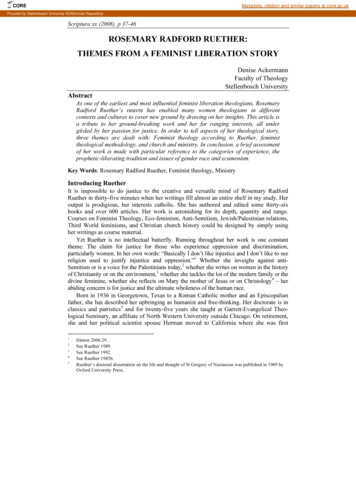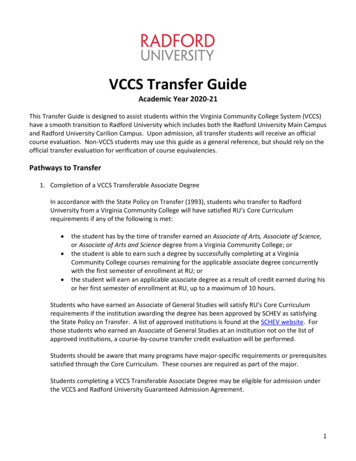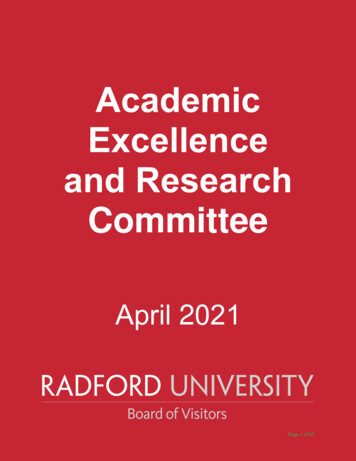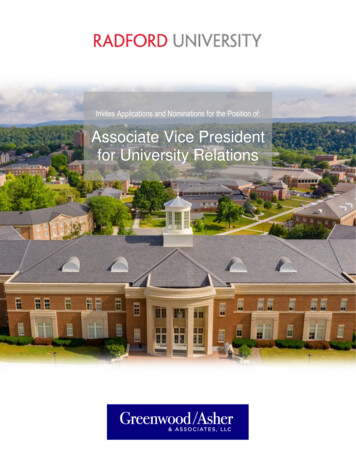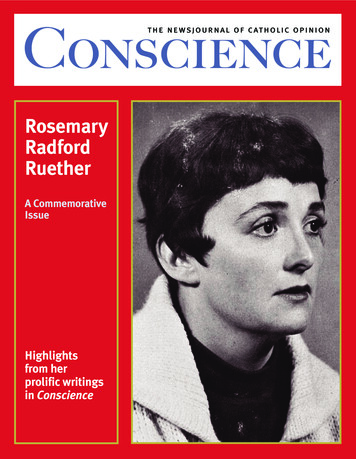
Transcription
the newsjournal of catholic opinionRosemaryRadfordRuetherA CommemorativeIssueHighlightsfrom herprolific writingsin Conscience
Conscienceletter from the presidentthe newsjournal of catholic opinionExecutive Editorjon o ’ brienEditordavid j. nolanconscience@CatholicsForChoice.orgContributing Editorsara morelloEditorial Adviserrosemary radford ruetherEditorial Associatekim puchirConscience is published by Catholics for Choice.Catholics for Choice shapes and advances sexualand reproductive ethics that are based on justice,reflect a commitment to women’s well-being andrespect and affirm the capacity of women and mento make moral decisions about their lives.Catholics for ChoicePresidentjon o ’ brienExecutive Vice Presidentsara morelloBoard of Directorssusan wysocki, ph.d., b.s.n., n.p., chairsheila briggs, m.a.patricia carbine, b.a.barbara deconcini, ph.d.susan farrell, ph.d.cheryl a. francisconi, m.s.w., m.p.h.ofelia garcia, m.f.a.eileen moran, ph.d.marysa navarro-aranguren, ph.d.rosemary radford ruether, ph.d. ( emerita )Católicas por el Derecho a Decidir, Argentinamarta alanisCatólicas por el Derecho a Decidir, Boliviateresa lanza monjeCatólicas pelo Direito de Decidir, Brasilmaría jose rosado nunesCatholics for Choice, Canadarosemary ganleyCatólicas por el Derecho a Decidir, Chileverónica díaz ramosCatólicas por el Derecho a Decidir, Colombiasandra patricia mazoCatólicas por el Derecho a Decidir, El Salvadorrosa gutiérrezCatólicas por el Derecho a Decidir, Españapaloma alfonsoCatholics for Choice, Europehenk baarsCatólicas por el Derecho a Decidir, Méxicomaría consuelo mejíaCatólicas por el Derecho a Decidir, Nicaraguamayte ochoa & magaly quintanaCatólicas por el Derecho a Decidir, Paraguaymonín carrizoCatólicas por el Derecho a Decidir, Perúeliana cano seminarioDesign and Productionletterforms typography & graphic designDesign Consultantspoint five, nyCatholics for Choice1436 U St., NW Suite 301 Washington, DC20009-3997 USA 1 (202) Choice.orgTh is issu e of c onscience is a c e l e br at ion of rose m a ryRadford Ruether and everything she’s given to Catholics forChoice—spiritually, intellectually and personally.Rosemary has helped set the bar for what a Catholic theologiancan be. Her work is unique because of her remarkable ability to putherself in another’s shoes, from early Christians to those of Mexican peasants(Lessons from Chiapas). It is what happens when, as Rosemary so aptly puts it,“you put yourself on the other side and you see things from the context ofthe oppressed.”Our work can sometimes be overwhelming in the face of a forbiddingorthodoxy. Those of us who are Catholic and believe in the freedom of conscienceneeded a giant. And we have one in Rosemary. For women, for prochoiceCatholics, for progressive theologians and social justice advocates, Rosemaryreassured us that we, too, could not only be redeemed, we could also redeem.We saw her as one of our own, armed with enough intellectual vigor andhonesty to defeat existing power brokers at their own game while teachingthem about her—our—territory.The force of Rosemary’s curiosity flows around every barrier in its path,often turning “You can’t” into “Why not?” She finds “a substantial continuity”between contraception and women’s personhood (Women, Sexuality, Ecologyand the Church), something we strive to place at the center of our work. Shealso sees no reason for faith to be excluded from the street—why shouldn’ttheological discussions be advertised in pasta shops (Thoughts on Being Cancelled in Rome)?Rosemary Radford Ruether knows what is at stake for anyone seeking towrite their own “stories of women liberators.” She recounted:“Eku, a Fante woman of Ghana led her people to a new land where they couldfind a good life, and risked her own life by tasting water from a pool to see if it waspoisonous before allowing her thirsty people to drink.”Like Eku, Rosemary found deep wells to sustain those of us thirsty forcutting-edge scholarship. At the forefront of her field, she drank fearlessly,heedless of the “poison” others may have thrown there, at times paying theprice with lost opportunities, exclusion and demonization. Her true courageis that she never flinched for a moment from her necessity to articulate thattruth. That liberation from fear means that this movement will long go on.Her writing will continue to slake the thirst of those in need of new storieswith a diverse cast of heroines.This special edition of Conscience is a tour through a selection of Rosemary’swritings, including original articles, transcripts of speeches, book reviews andmore. We hope you enjoy retracing her footsteps through some of the very bestof progressive Catholic thought.issn 0740-6835jon o ’ brienPresident, Catholics for ChoiceJune, 20112conscience: a commemor ative issue
letterstableof contentsrosemary r adford ruetherarticles2 Rosemary Radford Ruether (2010)Fearless Leader and Changemaker for ProgressiveCatholic Feminismpatti millerAll other articles by Rosemary Radford Ruether21 Created Second, Sinned First (1997)Women, Redemption, and theChallenge of Christian Feminist Theology25 Sex and the Body In the Catholic Tradition(1999-00)5 The Catholic Bishops’ Pastoral on Women:A Flawed Effort (1988)32 The Mantra of “Anti-Catholicism”:What is Bigotry? (2000)6 Prochoice Is Prolife:Winning the Propaganda War for ReproductiveRights (1989)33 Resisting the Silence (2001)Reflections on Joan Chittister’s Decision to Speak8 Women, Sexuality, Ecology, and the Church (1990)13 Watershed for Faithful Catholics (1993/94)14 Thoughts on Being Cancelled in Rome (1994)15 The Alliance That Fizzled (1994/95)The Vatican and Islamic Fundamentalists at Cairo17 Women and Culture (1995/96)The Case for Universal Rights20 Lessons from Chiapas (1995/96)35 The War on Women (2001-2002)38 An Enlightened Church? (2002) Letters to Young Catholics:Reflections on Being a Catholic39 Polarization Among Christians:Is Dialogue Possible? (2002)40 Sexual Illiteracy (2003)42 Talking About Abortion (2004-2005)The Choice to Speak Out43 Opinion: Distortion, Misrepresentationand Caricature (2004-2005)The Vatican’s Letter to Women isConfused About Scripture and Feminism45 Opinion: Benedict XVI’s First Encyclical:“God is Love” (2006)the newsjournal of catholic opinion46 A Consistent Life Ethic? (2007)Supporting Life after Birth50 Book Review: For the Good of the Church (2007)52 Opinion: Intellectual Freedom andthe Catholic University (2008)Conscience offers in-depth, cutting-edge coverage ofvital contemporary issues, including reproductive rights,sexuality and gender, feminism, the religious right,church and state issues and US politics. Our readershipincludes national and international opinion leaders andpolicymakers, members of the press and leaders in thefields of theology, ethics and women’s studies.53 Book Review: Fictionalizing the Unspeakable(2008-2009)Back Cover:Books by Rosemary Radford Ruetherrosemary r adford ruether1
Reprinted from Vol. XXXI, No. 3, 2010Rosemary Radford Ruetherfearless leader and changemakerfor progressive catholic feminismBy Patti MillerFew people h av e m a de theirmark on modern Catholicism asdecisively as feminist theologianRosemar y Radford Ruet her.From her early days in the CivilRights movement to her groundbreakingcritique of the Catholic hierarchy’s patriarchy and re-envisioning of Christiantheology to her pioneering work in ecofeminism, Ruether has made uniquecontributions to progressive Catholicism. Her influential book “Sexism andGod Talk,” among many other majorworks, helped usher in modern Christianfeminism.Conscience sat down to talk with Ruetherrecently in Atlanta, were she was attendingthe American Academy of Religion conference, about her career and work withCatholics for Choice as she prepares todepart the cfc Board of Directors, whichshe has served on since the early 1980s. Acareer spanning nearly 50 years and theconclusion of her role on the cfc boardnot w it hstanding, Ruet her remainspat ti miller is a former editor of and regularcontributor to Conscience.2conscience: a commemor ative issueengaged in the study of theology, enthusiastic about feminist scholarship anddeeply committed to her vision of Catholicism. She was on four panels at the conference addressing topics as diverse asdecolonial interpretations of Mary andChristian Zionism.Ruether’s life was imbued with thecontradictions of Catholicism from thestart. Her mother was Catholic and herfather Episcopalian and she was raised,as she puts it, “Catholic in an ecumenicalcontext.” It was perhaps inevitable thatshe herself would become a scholar of theclassics and church history and one of thehierarchy’s most constructive critics.“My mother took seriously what shethought of as the high intellectual tradition of Catholicism but she was alsocritical of what she saw as superstitious,dogmatic Catholicism,” notes Ruether.After receiving her BA in philosophyand history from Scripps College andmarrying political scientist HermanRuether in 1957, she entered ClaremontGraduate School, where she earned herMA in ancient history in 1960 and herPhD in classics and patristics—the studyof the early church “fathers”—in 1965.Despite her academic interest in churchhistory, reproductive rights were neverfar from her mind. In 1964, when thequestion of whether the Vatican wouldofficially approve of contraception wason everyone’s mind and she herself was ayoung mother balancing family and acareer, she wrote a piece for the Wash-ington Post Magazine entitled “Why aCatholic Mother Believes in Birth Control.” It eventually cost Ruether her firstteaching job at Immaculate Heart College in Los Angeles. “I had been hangingaround with the Immaculate Heart Sisters because the priest I was working withon Greek stuff was out there. And theyasked me to teach. But some trustees roseup in wrath and said ‘you can’t hire her’because of the Washington Post article,”Ruether recalls. “I remember the mothersuperior coming to me at the end of thefirst year and saying ‘I feel really terrible,but we are not going to be able to hire youfor another year.’ ”Ruether already had another job offer,teaching at the Howard University Schoolof Religion, so it wasn’t a major career setback. But it did teach her a valuable lesson.“It gave me the basic message: don’t workfor a Catholic institution,” she says.Teaching at the historically blackHoward wouldn’t seem like a natural fitfor a white woman schooled in the classics. But like other young progressiveactivists in the early 1960s, Ruether hadbecome involved in the Civil Rightsmovement. “The chaplains at ClaremontColleges were involved in civil rights, soI got involved though them,” explainsRuether. “They developed a summerimmersion program in Mississippi in1965—the summer after the ‘FreedomSummer’ when those civil rights volunteers were killed. I was there that summerwith the Delta ministry.”
The experience would shape her workin profound ways. “I got involved infeminism though the Civil Rights critique of male dominance,” she notes.“What you experienced in Mississippiwas looking at the United States fromthe southern black side. You see thewhite dominance and the racism. Thathas always been very important to me interms of social justice: that you put yourself on the other side and you see thingsfrom the context of the oppressed. Thefeminism that I got involved in wasrooted in social justice and in terms ofseeing sex, race and class hierarchies, notthe Betty Friedan kind of feminism.”In 1967 Ruether published one of hermost famous work s, “The Chu rchagainst Itself,” in which she criticized theinability of the hierarchy to “delve deeplyenough to create a viable theology ofradical change” on issues like birth control, marriage and sexuality because ofinine Face of the Church”(197 7), cu lm inat ing in“Sexism and God Talk” in1983. “Sexism and GodTalk” offered a radical critique of traditional Christ ia n t heolog y f rom afeminist perspective—areimaging of the Bible andChristianity from a woman’s point of view. “Sexismand God Talk” createdwhat the New York Timesca l led t he f i rst “f u l lfledged feminist theol ogy”within a Christian con text, influencing ageneration of feminist theologians.The book provided a feminist ethic torectify the traditional male-centered biasof Christianity, which, Ruether said, ledto subjugation and robbed women oftheir full humanity. It was this humanity,wrote Ruether, that she sought to restoreChoice). She had beeninvolved with the organization for a brief time afterits founding in 1973 butcffc had few formal prog rams to draw on t heboa rd’s ex per t ise a ndRuether became involvedwith other projects. Whena much larger and betterf inanced organizat ionreached out to her in theearly 1980s, she eagerlyrejoi ne d a nd q u ic k l ybecame vital to cffc ’ swork of providing an alternative interpretation of Catholic theology and teaching.“We actually have theologians on theboard who are contributing a criticalalternative theology on key questions ofsexuality and reproduction,” says Ruether.“This has allowed cfc to give intellectualrespectability to an alternative vision.“To me Catholicism is a community of a billion people who represent a range ofthings, so I don’t identify with the pope.”its irrational commitment to outdateddoctrines from the past. “In retrospectit becomes much more evident,” saysRuether today, “that it wasn’t that thechurch wasn’t able to develop a theologyof radical change but that the leadershipwas determined to prevent change.”Ruether taught at Howard for 10 years,taking time in the early 1970s to teachcourses about women and religion at Harvard Divinity School and Yale DivinitySchool. “It was in these two years from1972 to 1974 that I was really developingmy material. I didn’t think about Catholicism in an isolated way. I thought of it asthe broad western philosophical tradition.The Enlightenment was very misogynistic, too.” Her work would result in aseries of groundbreaking feminist theological works, such as “New Woman/New Earth: Sexist Ideologies and HumanLiberation” (1975), and “Mary— the Fem-with a new vision of Christian theology.She wrote that the “uniqueness of feminist theology lies not in its use of thecriterion of experience but rather in itsuse of women’s experience, which hasbeen almost entirely shut out of theological reflection in the past. The use ofwomen’s experience in feminist theology, therefore, explodes as a criticalforce, ex posing classical t heolog y,including its codified traditions, as basedon male experience rather than on universal human experience.”“I think the reason that feminist Catholic theology was important at that timewas because the Catholic hierarchy wasthe biggest problem – it has the mostexplicit and enforced theology that reallyimpeded abortion and reproductiverights,” says Ruether. It was around thistime that she joined the board of Catholics for a Free Choice (now Catholics forOtherwise the assumption is that womenwho critique the Vatican’s position arejust deviant, immoral people.”In addition to helping develop thetheological bedrock of much of cfc’swork, Ruether has had a long and personal involvement in cfc’s Latin American work with its partner organizationCatólicas por el Derecho a Decidir(Catholics for the Right to Decide—cdd), traveling to Latin America to network and speak, and, as in the UnitedStates, providing a theological underpinning for the cdds’ work. Her inter est inLatin America actually predated herwork with cfc. “My mother was born inMexico and I felt I had been robbed of acertain heritage, particularly the Spanishlanguage. Somewhere in my thirties Istarted going to Mexico to do Spanishand became involved in Catholic liberation the ol ogy circles, so picking up therosemary r adford ruether3
rosemary radford ruetherLatin American work with cfc and cddwas pick ing up a thread I had beenworking on.”Ruether cites the growth of vibrantcdd organizations in Latin America asbeing among cfc ’ s most important contributions. “Today we have several generations of the Latin American program.The formed themselves and have done avery good job of that. These are verysophisticated programs. They reallyunderstand how to appropriate the theological and canon law discourse. In several places in Latin America, c dd isintegrally related to the struggle for legalto duplicate c lericalism, which I wassympathetic to. So we said what we needis Women-Church, not women priests—feminist based communities.”A s s he w r o t e i n he r 1 9 8 5 b o ok“Women-Church,” “Christian feministscannot wait for the institutional churchesto reform themselves enough to providethe vehicles of faith and worship thatwomen need at this time.” Catholicwomen, she wrote, “are beginning torecognize the need for autonomous basesfor women’s theologizing and worship.”“I have been part of themovement for a long time inof her doctoral students are assemblinga collection of writings reflecting on herwork from multiple feminist theologicalperspectives covering feminist theology,colonization and globalization, and ecofeminism, entitled “Voices of FeministLiberation: Writings in Celebration ofRosemary Radford Ruether.”Ruether, who will remain active withcfc as editorial advisor to Conscience andwith other projects, continues to expandher horizons. Today her work is centeredon transnational feminism. “The direc-“The feminism that I got involved inwas rooted in social justice and in termsof seeing sex, race and class hierarchies, reutersnot the Betty Friedan kind of feminism.”change regarding abortion law andreproductive rights.”Ruether’s work evolved and broadened over the course of her career toinclude eco-feminist theology, whichlinks the oppression of women and thedomination of nature, themes which sheexplored in “Gaia and God: An Ecofeminist Theol ogy of Earth Healing”(1994). “The goal of this quest is earthhealing, a healed relationship betweenmen and women, between classes andnations, and between humans and theearth,” wrote Ruether in what became aclassic on the subject.A nother area that Ruether is passionate about—both as a scholar and aparticipant—is the Women-Churchmovement, which envisions grassroots,feminist liturgical communities freedfrom patriarchal models. “The women’sordinat ion movement be g an in t he1970s,” notes Ruether, “but in the 1980s,through the inf luence of women likeMary Hunt, they began to reject the ideaof women’s ordination as simply trying4conscience: a commemor ative issueRuether worked tirelessly throughout Latin America paving theterms of feminist liturgy,” way for contemporary feminists, such those advocating forsays Ruether, who partici- abortion law reform in Mexico City, above, on April 22, 1999.pates in a local group near herhome in Claremont, Calif., although she tion I am going in is not only ecumenicalnotes the need to model grassroots, Christian but increasingly interested infamily liturgies for those who don’t just gathering perspectives across ethnicitieswant to be a part of an all-woman group. and religions. Claremont has one of theAnd despite the many shortcomings of few programs that offer a PhD in womenthe institutional church, she remains and religion and we just celebrated ourupbeat about “her” Catholicism: “To me 20th anniversary. We have MormonsCatholicism is a community of a billion doing feminist studies and trying to dopeople who represent a range of things, feminism in a way that challenges thatso I don’t identify with the pope. My tradition and we have more and moreCatholicism is the progressive, feminist Muslims who are doing feminism.”liberation theology wing of Catholicism.Ruether has been challenging traditionsThat is the Catholicism that I belong to, herself for nearly 50 years. Yet for her it isthat I am connected to around the globe.” a joyful journey. “I have had a happy life,”Ruether has influenced generations of she says, in no small measure due to herscholars from her teaching positions at determination to find ways to express herGarrett-Evangelical Theological Semi- work and worship outside the confines ofnary, where she taught from the mid- institutional Catholicism. “I seek to sup1970s until the early 2000s, and the port and widen the space for that CatholiClaremont School of Theology and Cla- cism,” she says, referring to her brand ofremont Graduate University, where she global, progressive, feminist Catholicism,teaches today, and numerous books and “and to create as many obstacles as possiblevisiting professorships. Two generations for patriarchal Catholicism.”
Reprinted from Vol. IX, No. 3, May/June 1988The Catholic Bishops’Pastoral on Women:A Flawed EffortBy Rosemary Radford RuetherTh e u. s. rom a n c at hol icbishops have issued the firstdraft of a pastoral letter in“ R e s p o n s e t o Wo m e n’sConcerns.” This pastoral waswritten as a result of consultation with awide range of U.S. Catholic women’sgroups, ranging from the Women’sOrdination Conference to the Daughtersof Isabella. During the hearings, whichthe bishops conducted in efforts to listento these groups, Catholic women repeatedly suggested that the bishops eithershould refrain from writing a pastoralletter, since they were not qualified tospeak on the subject of women, or elsewrite a pastoral on patriarchy, not onwomen. Just as previous pastorals hadbeen on systemic evils, such as racism ormilitarism and not on blacks or soldiers,so a pastoral on sexism should actuallyname that systemic evil and not thevictims of that evil, as though they werethe “problem.”The bishops declined to follow thesesuggest ions, but t hey attempted tomodif y their claims to authorit y byt itling their pastoral modestly as a“response” to women’s concerns anddeclaring that they in no way mean “toThis article is reprinted from Christianity andCrisis with permission from the author,rosem ary r adford ruether , who is aprofessor of applied theology at GarrettEvangelical Theological Seminary and a cffcboard member.The bishops have little sense of what sexism is,as a part of a legal, social, political, economic andideological system.define women, to prescribe roles forthem, or to tell them who they are andwhat they should do.” The result is af lawed effort. The episcopal authorscome across as desperately sincere, trulydesiring to say and do the right thingstoward this “other half” of the humanrace about whom they realize they knowvery little. But their efforts are highlyconstricted. They do not feel empowered to question any church teachingson such matters as birth control, divorce,lifelong celibacy for the unmarried, orthe rejection of the ordination of women.They even repeat their refusal to support the Equal Rights Amendment (era).The bishops use a spirited language todenounce sexism as a sin and to declaretheir own intention to repent of it:We must and do pledge to reject clearlyand consistently human structures andpatterns of activity that in any way treatwomen as of lesser worth than men.When our actions do not conform to ourideals, all suffer. We, therefore, regretand confess our individual and collectivefailures to respond to women as theydeserve. We call the people of God tojoin us in personal and corporatecontrition for the sins of sexism thatviolate the basic tenets of our faith.(Pastoral, paragraph 41)In spite of such statements, the bishopshave little sense of what sexism is, as apart of a legal, social, political, economicand ideological system. They have nottried to study its history or how it hasshaped the church itself, both institutionally and ideologically. Conse quently,their denunciations of sexism still function as a way of deploring personal failures of charity which, for some unknownreason, have abounded in our churchesand societies. They are also caughtbe t ween denouncing a tradition andusing a tradition as though it were immutable. They don’t even seem to be awareof this as a problem.Their basic theological starting pointis Genesis 1:27 which t hey take forgranted as meaning, and as having alwaysmeant, complete equality and partnerrosemary r adford ruether5
ship between men and women. Theyignore the fact that, for most of Christian history, this text was interpretedasymmetrically. According to Augustine, men alone possess the image ofGod, and women are the image of Godonly when taken “together with the manwho is their head.” More recent Catholicanthropology has moved from arguments for women’s natural inferiority toarguments for their “difference” andcomplementary relations to men.The bishops disregard these historical traditions for an anthropology ofequivalence and partnership of equals.They seek to carr y this through byaffirming women’s partnership withmen in the family, in society and in thechurch. However, they are unable tocarry this partnership model throughin any of these areas. Their underlyingpresuppositions remain those of patriarchal clericalism.Their affirmation of the partnershipof women and men in the family isseverely restricted because they feel theyhave no adequate teaching on women’sreproductive rights, and even more,because their support for the values ofmotherhood is not matched by any corresponding affirmation of fatherhood.Women are said to have a “vocation” tomotherhood, while men are never saidto have any vocation to fatherhood. Thismeans that parenting is, in fact, not a“partnership,” but a female job. Fathers“help” mothers in what remains essentially “women’s work.”In addressing women’s work in theworld, the bishops recognize women’srights to equal pay for work of comparable value (despite refusing to supportthe er a), and pledge to help the singlemother with services such as day care.But they acknowledge that women workonly out of economic necessity, to helptheir families. Women are never said tohave a vocation in society. Thus theirbasic ideal remains the full-time motherwho does not work. The bishops have nosense that it is precisely this model ofwomen as unskilled dependents which ishighlights from future shockReprinted from Vol. X, No. 5, September/October 1989From June 2-4, 1989, cffc sponsored a landmark conference—future shock: NewChallenges in Ethics and Reproductive Health. Involving nearly three hundred people,the conference provided participants a forum for discussing a wide range of reproductivehealth care issues, including contraception, sexual ethics, abortion, new reproductivetechnology, and public policy. Below is an excerpt from a session.Prochoice Is Prolife:Winning the Propaganda Warfor Reproductive RightsBy Rosemary Radford RuetherFor seventeen years, sincethe Supreme Court decision ofRoe v. Wade, right-wing forceswishing to reverse the Court’sdecision and recrim i nalizeabortion have sought to wrap them-rosem ary r adford ruether is GeorgiaHarkness Professor of Applied Theology atGarrett- Evangelical Theological Seminaryand is a cffc board member.6conscience a commemor ative issueconscience:selves in the flag of absolute virtue andclaimed to represent the “right to life.”To defeat this crusade, it is imperativethat the reproductive rights movementbecome much more persuasive i ncon v inc ing middle-of-the-road Americans that antichoice is antilife. It needsto make clear that the ultimate goal ofthe antichoice movement is both torecriminalize abortion and to blockaccess to sexual education and contraception, especially for poor women,teenagers, and poor nations, the verypeople whose lives are most devastatedby unregulated reproduction.The anticontraceptive effects of therecriminalization movement need to behighlighted because most middle Americans take access to contraception forgranted. They don’t recognize the anticont racept ive bias of much of t herecriminalization movement and itseffects, especially on young and poorwomen and on impoverished nationsaround the world. In these nations,st r uggling wit h staggering demographic growth, mal nourished babiesare born to mothers already overburdened with children they cannot carefor. And they are dying every day by thethousands.Antichoice is antilife! This is the mottowe need to claim. Antichoice fundamentally opposes all the conditions—cultural, social, medical, and legal—thatpromote the possibility of a womanbeing able to conceive and bear children
the catholic bishops ’ pastoral on women: a fl awed effortWomen are said to have a “vocation” to motherhood, while men are never said tohave any vocation to fatherhood.the root of the feminization of poverty.When the bishops turn to the topic ofpartnership in the church, all they canreally offer is partnership of women withmen in the ministry of the laity. Theyare ready to endorse this offer with a fullarray of new ministries, such as eucharistic ministers, lay administrators ofparishes and chancellors of dioceses.They even suggest that women shouldpreach. But the ordained priesthoodremains permanently closed, by its verynature, as an icon of the male Christ.Thus their theology of clergy andlaity, like their view of family and society,remains dualistic. Oddly enough, thisreverses the classical Christian tradition,where women were unequal in nature,but equal in grace. For the bishops,women and men are equals on the levelof “nature”; i.e. the laity. But the sphereof grace, or the priesthood, remainswhen she wants them and is best able tocare for t hem. It is f undamentallyagainst the cultural, social, medical, andlegal conditions that help societies limitdemographic growth and so have somechance of providing adequate food,housing, education, and health care forthose children who are born. “Life” inhumans or any other species is not promoted by unregulated birth but byplanned and chosen births that are inharmony with the social means to sustain the lives of those who are born.Prochoice Catholics must unmaskthe facile and delusory rhetoric andtactics of those Catholics who equateantichoice with antiwar a
the Catholic University (2008) 53. eview: Fictionalizing the Unspeakable Book R (2008-2009) ver: Back Co Books by Rosemary Radford Ruether. osemary Radford Ruether (2010)R Catholic Feminism. patti miller. ll other articles by Rosemary Radford RuetherA 5. The Catholic Bishops' Pastoral on Women: A Flawed Effort (1988) 6. rochoice Is Prolife: P
